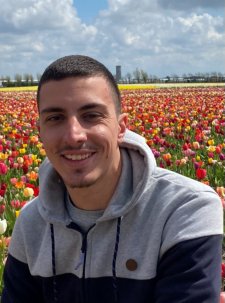
(Erasmus) Master student
Building: Technhal, room TL 3384
Phone: +31 (0)53 489 1116 (personal: +351 938 311 132)
E-mail: jasantiago99@hotmail.com or j.almeidasantiago@student.utwente.nl
Biography
I am a Portuguese student on my way to get my Master's in Bioengineering from the University of Porto, Portugal. Being highly enthusiastic in mathematics on top of biology and the fascinating bridges between them, I found in Biomedical Engineering the balance between both. I consider it fascinating how today's technology benefits the health and allows us to know more about complex diseases.
I often find myself involved in student associations because of their inherent social component. I believe getting to know people around you is the best way to explore the world surrounding you. A big fan of traveling, I try to grasp the most I can culturewise in each new place from the people I encounter. Having done an Erasmus internship with the CNPH group, I found the opportunity of one of my areas of interest and has so I decided to return and develop my thesis with this team.
Research interests
The project I am going to develop for my thesis is related with Local Field Potentials. Multielectrode arrays are able to record action potentials (APs), the output of neurons. Several publications suggest that local field potentials (LFPs) can be captured by these devices and reflect synaptic currents, which could represent the input to the neurons, but this is not undebated. Differences between inhibitory and excitatory LFPs may also be a possibility. As so, verifying that currently believed to be LFPs are not artifacts of the measurement system is important and the first step of my project. Shall the results be that LFPs are indeed valid, then it becomes a measure of interest in clinical neurophysiology to define the relationship between neurons’ inputs and outputs. The relation between LFPs and APs can provide a way of measuring neurons’ excitability, variable that is very important when dealing to cell death due to blockade of the input.
